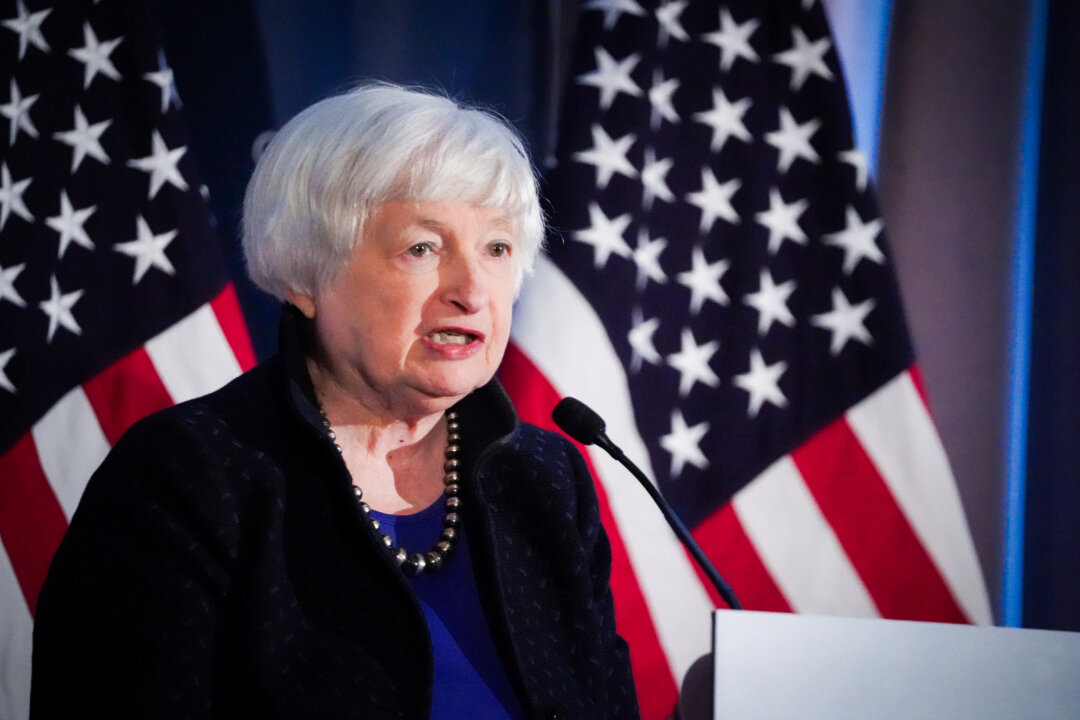‘China’s overcapacity distorts global prices and production patterns and hurts American firms and workers, as well as firms and workers around the world.’
Treasury Secretary Janet Yellen says she will “press” her Chinese counterparts to address China’s manufacturing overcapacity for green energy products during her “next trip” to the country.
“I am concerned about global spillovers from the excess capacity that we are seeing in China,” Ms. Yellen said during a speech in Georgia on March 27. “China’s overcapacity distorts global prices and production patterns and hurts American firms and workers, as well as firms and workers around the world.”
Ms. Yellen was in Norcross, Georgia, to tour Suniva, a solar cell manufacturer that filed for bankruptcy in 2017 in part because of cheap imports primarily from China. The company is restarting partly because of incentives provided by the Inflation Reduction Act, which President Joe Biden signed into law in August 2022.
“In the past, in industries like steel and aluminum, Chinese government support led to substantial overinvestment and excess capacity that Chinese firms looked to export abroad at depressed prices. This maintained production and employment in China but forced industry in the rest of the world to contract,” Ms. Yellen said.
“Now, we see excess capacity building in new industries like solar, EVs, and lithium-ion batteries.”
According to data from the International Energy Agency, China accounted for 74–96 percent of the global production of four major components of solar panels in 2021 but demanded only 36.4 percent of its manufacturing output.
In 2023, China overtook Japan as the world’s biggest auto exporter, according to official data from the two countries released last month. In the final quarter of last year, Chinese electric carmaker BYD Auto Co. sold more electric vehicles (EVs) than Tesla.
Meanwhile, China accounts for about 75 percent of the global production of lithium-ion batteries.
Ms. Yellen said the Biden administration had raised issues of overcapacity with China in previous bilateral talks.
“I plan to make it a key issue in discussions during my next trip there,” she said. “I will press my Chinese counterparts to take necessary steps to address this issue.”
According to the 2024 annual business climate report published by the American Chamber of Commerce in China earlier this year, government financial assistance, or subsidies, was among the top five foremost concerns regarding the unfair treatment of U.S. firms in China and Hong Kong. The others included market access, regulatory enforcement, and licensing.
The Department of the Treasury has not formally announced Ms. Yellen’s upcoming China trip. However, some media outlets have reported that she will travel to China in April, citing unnamed sources.
During her 2023 trip to China, Ms. Yellen met with several senior Chinese Communist Party officials, including Premier Li Qiang and Vice Premier He Lifeng.The Alliance for American Manufacturing (AAM), a U.S. manufacturing advocacy group, issued a statement welcoming Ms. Yellen’s effort to address China’s overcapacity.
“China’s overcapacity has already wrecked too many industries in America over the past two decades,” AAM President Scott Paul said. “Beijing’s policies and past administrations’ hesitancy to appropriately prevent or respond to the threat left us in a weakened state.
“It’s critical that the Biden administration and Congress proactively deploy existing trade tools and develop new ones to prevent job losses before it’s too late.
“We must also ensure that Chinese companies don’t simply use our trade partners as a back door to the American market, or to distort it by locating minor operations here dependent on the Chinese supply chain in a way that displaces our emerging industries.”
Last month, the AAM published a report that warned that China poses an “existential threat” to the American auto industry if Chinese auto companies use Mexico as “backdoor access” to sell vehicles in the United States. By manufacturing in Mexico, Chinese automakers will enjoy “more favorable tariffs” under the United States–Mexico–Canada Agreement.
“There is cause for alarm that Chinese vehicles and parts will only increase their access to the U.S. market, overcoming existing tariffs and evading existing trade enforcement measures, to directly challenge domestic automakers and threaten the jobs of millions of American manufacturing workers,” the report reads.
Earlier this month, Sens. Jon Ossoff (D-Ga.) and Raphael Warnock (D-Ga.) sent a letter to President Biden urging him to eliminate the tariff exemption for bifacial solar modules. They pointed out that U.S. imports of bifacial modules doubled between 2020 and 2022.
“The solar manufacturing industry is at a crucial turning point, spurred by incentives in the Inflation Reduction Act. During the final two years of the 201 tariffs, it is essential that their implementation supports the growing U.S. solar manufacturing industry, which is critical to our nation’s energy security and energy independence from China,” the letter reads.
In a separate letter sent to President Biden in January, Mr. Ossoff and Mr. Warnock, along with Sens. Sherrod Brown (D-Ohio) and Marco Rubio (R-Fla.), asked the president to increase tariffs on Chinese solar imports.
“China’s aggressive subsidies for its own solar manufacturing industry demonstrate its intent to control the industry globally,” the letter reads.
“By 2026, China will have enough capacity to meet annual global demand for the next ten years. This capacity is an existential threat to the U.S. solar industry and American energy security.”

